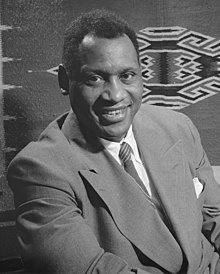Paul Leroy Robeson
| Paul Robeson | |
|---|---|

Robeson in 1942
|
|
| Born |
Paul Leroy Robeson April 9, 1898 Princeton, New Jersey, U.S. |
| Died | January 23, 1976 (aged 77) Philadelphia, Pennsylvania, U.S. |
| Alma mater |
Rutgers College (1919) Columbia Law School (1922) SOAS, University of London |
| Occupation | Singer, actor, social activist, lawyer, athlete |
| Spouse(s) | Eslanda Goode (m. 1921; d. 1965) |
| Children | Paul Robeson Jr. |

Robeson in football uniform at Rutgers, c. 1919
|
|||||||||
| No. 21, 17 | |||||||||
|---|---|---|---|---|---|---|---|---|---|
| Position: | End / tackle | ||||||||
| Personal information | |||||||||
| Height: | 6 ft 3 in (1.91 m) | ||||||||
| Weight: | 219 lb (99 kg) | ||||||||
| Career information | |||||||||
| High school: | Somerville (NJ) | ||||||||
| College: | Rutgers | ||||||||
| Career history | |||||||||
| Career highlights and awards | |||||||||
|
|||||||||
| Career NFL statistics | |||||||||
|
|||||||||
| Player stats at PFR | |||||||||
| Games played: | 15 |
|---|---|
| Games started: | 15 |
| Touchdowns: | 2 |
| Player stats at NFL.com | |
Paul Leroy Robeson (pronounced /ˈroʊbsən/ ROHB-sən; April 9, 1898 – January 23, 1976) was an American bass singer and actor who became involved with the Civil Rights Movement. At Rutgers College, he was an outstanding American football player, and then had an international career in singing, with a distinctive, powerful, deep bass voice, as well as acting in theater and movies. He became politically involved in response to the Spanish Civil War, fascism, and social injustices. His advocacy of anti-imperialism, affiliation with communism, and criticism of the United States government caused him to be blacklisted during the McCarthy era.
In 1915 Robeson won an academic scholarship to Rutgers College, where he was twice named a consensus All-American and was the class valedictorian. Almost eighty years later, he was inducted into the College Football Hall of Fame. He received his LL.B. from Columbia Law School, while playing in the National Football League (NFL). At Columbia, he sang and acted in off-campus productions; and, after graduating, he became a figure in the Harlem Renaissance with performances in The Emperor Jones and All God's Chillun Got Wings.
...
Wikipedia
